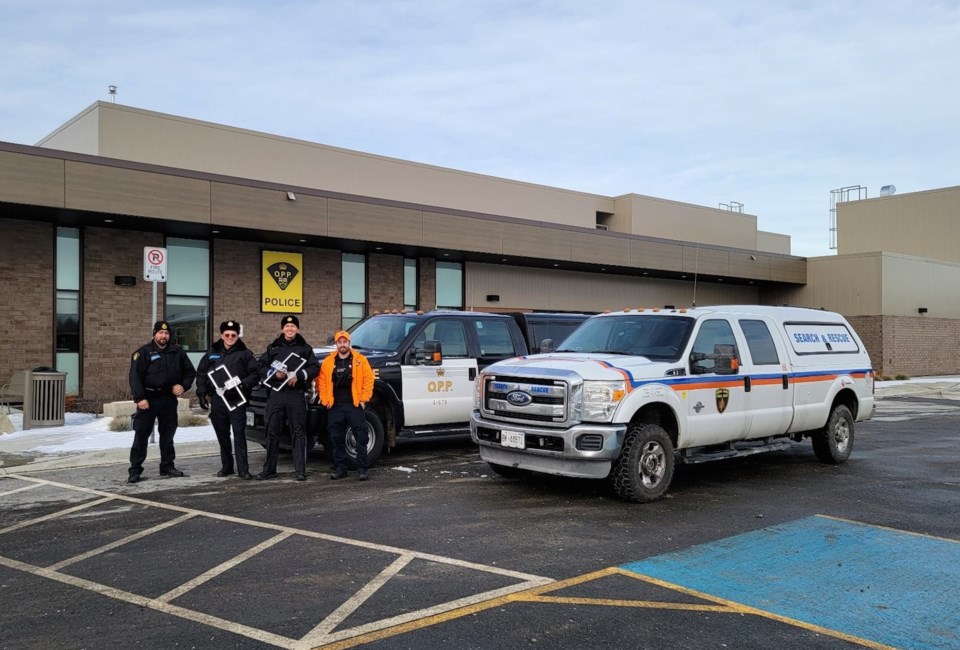NEWS RELEASE
ONTARIO PROVINCIAL POLICE
********************************
LITTLE CURRENT - The Manitoulin Detachment of the Ontario Provincial Police (OPP) is proud to report that Project Lifesaver is up and running on Manitoulin Island and Espanola.
Project Lifesaver is a radio frequency-based tracking system. The technology has been around for many years. It is accurate, simple, and dependable. The system is for people of all ages who are high risk vulnerable persons. They must tend to "wander" and have been diagnosed with Alzheimer's or other dementias, Autism, Down Syndrome or other form of cognitive delay.
Project Lifesaver clients wear a personalized wristband that emits a unique tracking signal. When caregivers notify police that the person is missing, in addition to regular police resources, Project Lifesaver trained OPP officers respond to the area where the lost person was last seen and searches the area with a mobile location tracking system.
The Project Lifesaver wristband is a one-ounce, battery-operated wrist transmitter emitting a unique FM radio frequency-based signal that emits a signal every second, 24 hours a day.
The signal can be tracked on the ground for approximately 2.5 km, or in the air from the helicopter, approximately 8-10 km. As each wristband has a unique radio frequency, the Project Lifesaver team can positively locate and identify the person who has wandered away from home using portable directional antennae to locate the signal. The transmitter (in the bracelet) is powered by a battery that is changed approximately every 60 days. Caregivers are provided with a battery tester and are required to manually test the battery daily.
The receivers work with two interchangeable antennas. The "Omni" antenna has a magnetic base that allows it to be secured to the roof of responding OPP vehicles. It has less range than the "Yagi" antenna but does allow for the transmitted signal to be received from any direction, making it an ideal option for mobile sweeps of search areas. Once a signal is picked up with the Omni antenna, there is then a switch to the Yagi antenna from that location.
The primary antenna is the "Yagi" style antenna. The Yagi allows us to make use of the maximum range of the bracelets and have the advantage of being directional. Police responders can determine the direction and approximate distance of the transmitter from their own positions.
Radio vs. GPS
GPS is the most accurate navigation system in the world, but the navigation signals are very weak and can be difficult to locate in blocked environments, such as inside buildings or structures. The clients that are registered with Project Lifesaver do not exhibit traditional lost person characteristics and often do not realize they are, in fact, lost. Oftentimes, they will wander into areas where GPS signal penetration is very poor such as underground parking, dense bush or inside structures. These are reasons why the radio frequency-based Project Lifesaver system is beneficial for these applications.
The task of searching for wandering or lost individuals with Alzheimer's, autism, Down syndrome, dementia or other cognitive conditions is a growing and serious responsibility. Without effective procedures and equipment, searches can involve multiple agencies, hundreds of officers, countless man hours and thousands of dollars.
More importantly, because time is of the essence, every minute lost increases the risk of a tragic outcome. Most who wander are found within a few kilometres of home. Search times when using Project Lifesaver have been reduced from days and hours, to just a few minutes. Recovery times for Project Lifesaver clients average 30 minutes - 95 per cent less time than standard operations.
The Manitoulin OPP is still in charge of the search, and will still call all applicable resources, such as the Emergency Response Team (ERT), Canine Unit, and OPP Helicopter.
"Project Lifesaver is just another tool in the toolbox to help us save lives,” says Provincial Constable John Hill from Manitoulin OPP. "It has a proven track record here in Ontario and Domtar's donation has helped to ensure that Manitoulin Island and the North Shore have the best system available."
"We are thrilled to be taking on the administrative role for Project Lifesaver in our communities and furthering our relationship with the OPP,” says Jessica Summers, a victim support specialist with Manitoulin Northshore Victim Services. "I am so happy we can offer this program to at-risk individuals who are prone to wandering and help their caregivers feel more at ease. I would also like to send a huge thank you to the donors who have helped make the program possible."
Please see online for more information on Project Lifesaver. For more information on enrolling a loved one, please contact Manitoulin Northshore Victim Services at 705-370-3378 or [email protected].
Project Lifesaver would not have been possible without the generous support of Domtar Corporation and Manitoulin Northshore Victim Services. A special thank you goes out to them.
********************************
